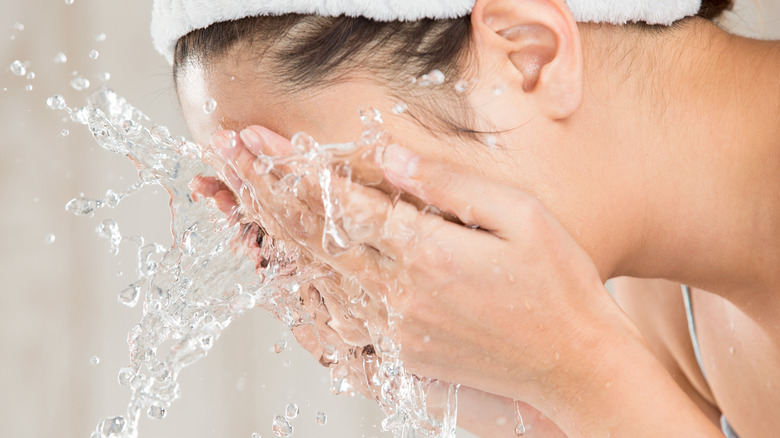When You Don't Wash Your Face Before Bed, This Is What Happens
Washing your face every day is an important part of facial cleanliness and personal hygiene. That's because washing your face can help unclog your pores and remove any dirt, makeup, dead skin cells, and excess oil on your skin (via Self). Many facial cleansers can even help reduce inflammation and treat and prevent skin conditions like acne.
To wash your face, wet your face with warm water and apply cleanser to your face with your fingers. Wash your face for 20 to 30 seconds or until the soap lathers and rinse it off of your face. "Make sure to wash the T-zone and U-zone (around the jawline), as these are areas people tend to ignore," Dr. Jerome Garden, the director of the Physicians Laser and Dermatology Institute in Chicago, told Self. Once you're done rinsing your face, you can gently pat it dry with a clean towel. However, when you wash your face is just as important as how you wash it.
Aim to wash your face every night
Ideally, you should wash your face two times a day: in the morning and at night before you go to bed. Washing your face at night is particularly important, however, especially if you wear makeup (via Bustle). Sleeping with your makeup on can cause breakouts and dehydrate your skin. Not to mention, all of the makeup, dirt, and oils on your face can rub off on your pillow and end up clogging your pores.
While forgetting to wash your face one time won't be the end of the world, you should aim to wash your face every night if you can. "Life happens sometimes, so going a day without washing your face will not totally ruin your skin — but making a bad habit of not doing so most days leads to a cascade of poor outcomes in your skin health," Dr. Adeline Kikam, a board-certified dermatologist and the founder of Brown Skin Derm, told Martha Stewart. Continually not washing your face at night can lead to dryness, breakouts, eczema, and premature aging.


